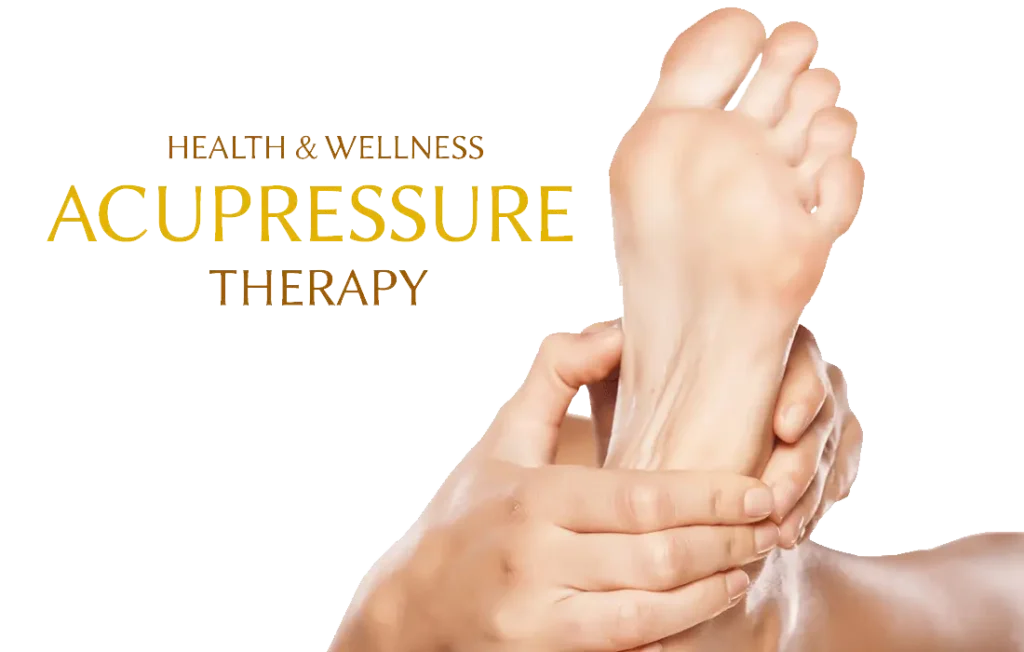What is Acupressure Therapy?
Acupressure is an ancient healing technique rooted in Traditional Chinese Medicine (TCM). It involves applying gentle but firm pressure to specific points on the body, called acupoints. These points are located along energy channels known as meridians, where vital life energy, or “qi” (pronounced “chee”), flows. The goal of acupressure is to balance this energy flow, promoting physical and emotional well-being.
How Does Acupressure Therapy Work?
Acupressure works by stimulation the body’s natural healing

abilities. When pressure is applied to acupoints, it helps release tension, improves blood circulation, and promotes relaxation. The stimulation of these points influences the body’s internal energy flow, helping to restore balance and alleviate symptoms of various conditions. In essence, acupressure works similarly to acupuncture but without the use of needles, relying instead on the hands or specialized tools to apply pressure.
Benefits of Acupressure
Acupressure has numerous benefits, both physical and emotional, including:
- Pain relief: It is effective for alleviating pain in the back, neck, shoulders, and joints.
- Reduced stress and anxiety: By balancing the body’s energy, acupressure helps reduce feelings of stress and anxiety, promoting a sense of calm.
- Improved circulation: Acupressure stimulates blood flow, helping to deliver nutrients and oxygen more efficiently throughout the body.
- Enhanced relaxation and sleep: It can relax the muscles and nervous system, leading to better sleep and overall relaxation.
- Boosted immune function: By balancing the body’s energy and promoting better circulation, acupressure may strengthen the immune system.
- Digestive support: Acupressure can help with digestive issues like bloating, constipation, and indigestion.
Contraindications of Acupressure
While acupressure is generally safe, there are a few situations where it might not be appropriate:
- Pregnancy: Certain acupoints, especially around the abdomen and lower back, should be avoided during pregnancy unless performed by a practitioner experienced with prenatal care.
- Infections or wounds: Avoid acupressure on areas where the skin is broken, bruised, or infected.
- Serious heart conditions: People with heart disease should consult their healthcare provider before receiving acupressure.
- Bone fractures or acute injuries: Acupressure should not be applied to areas with fractures or serious injuries until they have healed.
Conditions Acupressure Can Help Improve or Eliminate
Acupressure therapy is known to be effective in treating and managing a wide range of conditions, including:
- Headaches and migraines
- Chronic pain, including back, neck, and joint pain
- Tension and stress
- Digestive issues (constipation, bloating, indigestion)
- Menstrual cramps and menopausal symptoms
- Insomnia and other sleep disorders
- Nausea, including morning sickness and post-operative nausea
- Anxiety and depression
- Arthritis and joint stiffness
- Allergies and sinus problems
- Fatigue and low energy levels
- Muscle tension and tightness
- Post-surgical recovery
- Sciatica
- Plus, many other issues not listed here…
Acupressure vs. Acupuncture: Similarities and Differences
Similarities:
- Both acupressure and acupuncture are based on Traditional Chinese Medicine principles, focusing on balancing the body’s qi (energy) by stimulating specific points along meridians.
- Both therapies target the same acupoints to promote healing, improve circulation, reduce pain, and enhance overall well-being.
- Both can be used to treat a wide variety of physical and emotional conditions, from pain relief to stress management.
Differences:
- Acupressure: Uses pressure applied by hands, fingers, or tools to stimulate the acupoints. It is non-invasive and suitable for people who prefer a needle-free experience.
- Acupuncture: Uses thin needles inserted into the skin at acupoints to stimulate the body’s energy. It may offer more direct stimulation of deeper layers of tissue.
Do Acupressure and Acupuncture Provide Similar Results?
Yes, acupressure can provide results that are just as effective as acupuncture for many conditions, especially for pain relief, stress reduction, and overall wellness. Acupressure is a great option for those who are uncomfortable with needles, making it a gentle but powerful alternative to acupuncture.
Both therapies work with the body’s natural energy to promote healing, and their effectiveness often depends on the skill of the practitioner and the specific needs of the individual.
Book An AcupRESSure Therapy Session Now
Now is the best time to begin improving your health by implementing this ancient healing technique. This is also a perfect addition to any other alternative and non-invasive healing techniques you may be undergoing such as chiropractic care, massage therapy, physical therapy or any other kind of therapy. You won’t be able to match the convenience or the price in any of the surrounding areas that provide acupressure therapy. Aoy is currently offering special deals as she begins her healing journey right here in Zumbrota.
testimonials

Absolutely AMAZING. My aunt referred this place to me. He has gotten my heartburn to go away and made my shoulders loose which have been tight for about 5 years. He doesn’t pop or crack anything. He uses a pressure technique that sets things into place. He is just amazing. I would definitely recommend to everyone.
– Megan W. F.

Never been to a chiropractor in my life, I woke up with severe lower back pain, could hardly walk. Dr. Post took the information I gave him and determined what needed to be done. When I left, I was 50% better, 2 days later just about 100%. I couldn’t be happier with my results.
– Greg B.

